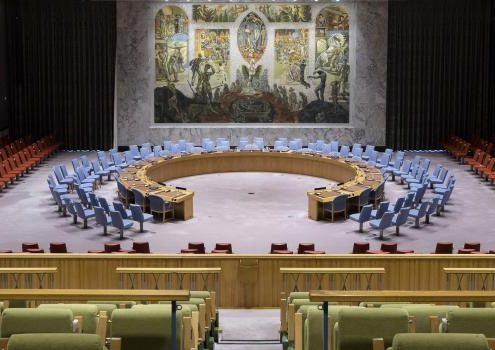
Colin Powell, the US Secretary of State, demonstrates a vial with alleged Iraq chemical weapon probes to the UN Security Council on Iraq war hearings, 5 February 2003
The Security Council is charged with maintaining peace and security among countries. While other organs of the UN can only make “recommendations” to member states, the Security Council has the power to make binding decisions that member states have agreed to carry out, under the terms of Charter Article 25. The decisions of the council are known as United Nations Security Council resolutions.[96]
The Security Council is made up of fifteen member states, consisting of five permanent members—China, France, Russia, the United Kingdom, and the United States—and ten non-permanent members elected for two-year terms by the General Assembly (with end of term date)—Belgium (term ends 2020), Dominican Republic (2020), Estonia (2021), Germany (2020), Indonesia (2020), Niger (2021), Saint Vincent and the Grenadines (2021), South Africa (2020), Tunisia (2021), and Vietnam (2021).[97] The five permanent members hold veto power over UN resolutions, allowing a permanent member to block adoption of a resolution, though not debate. The ten temporary seats are held for two-year terms, with five member states per year voted in by the General Assembly on a regional basis. The presidency of the Security Council rotates alphabetically each month.


